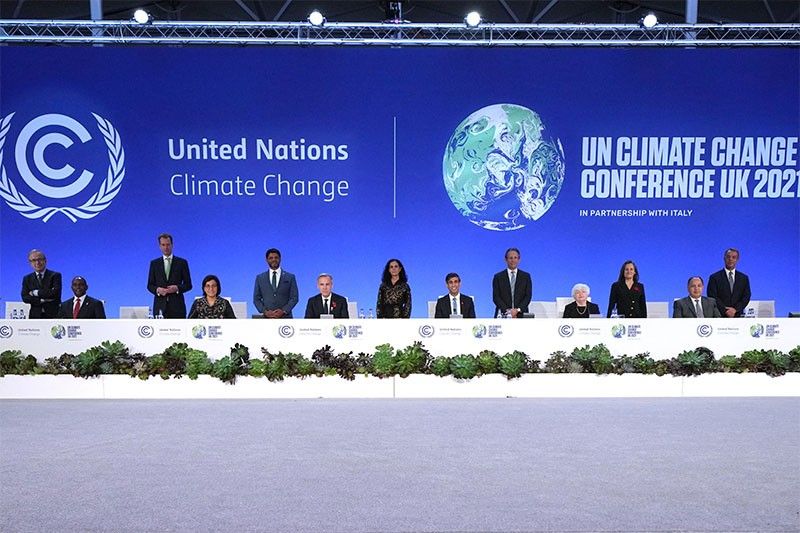'The money is here': COP26 banks on boosting climate finance

GLASGOW, United Kingdom — How can the world find the cash to limit global warming to liveable levels and completely decarbonise the economy within 30 years? That's the $100-trillion-dollar question.
Cost estimates vary but it is thought that it will take between $3-4 trillion annually — around 2 percent of global GDP — to reach net-zero by mid-century.
Financiers and governments at the COP26 summit believe they have found a way to come up with enough.
"The money is here if the world wants to use it," said UN climate finance envoy Mark Carney, who has overseen the creation of a vast alliance of banks and funds that say their portfolios are ready for net-zero investments.
The Glasgow Financial Alliance for Net Zero (GFANZ) represents assets worth $130 trillion, which Carney and others said it could be mobilised to pay for the world's transition to carbon neutrality.
Its institutions will work towards cutting emissions by 50 percent by 2030, will need to report on progress every year and submit enhanced funding plans every five.
"We now have the essential plumbing in place to move climate change from the fringes to the forefront of finance so that every financial decision takes climate change into account," Carney said.
Finance is a fundamental part of climate action, in theory freeing up developing countries' national budgets and helping them build green infrastructure.
But a historic lack of money from rich emitters has hampered nations' plans.
"We're very engaged in climate action. But finance is a fundamental problem, and it will determine the delivery of our promises," said Indonesian finance minister Sri Mulyani Indrawati.
"We don't need $130 trillion, just $270 billion!" she said, referring to the estimated annual cost of her country decarbonising by mid-century.
The Glasgow funding initiative also raised the hackles of environmental groups, who pointed out that it left the door open for the funds involved to continue investing in fossil fuels.
"More than $130 trillion and not a single rule to prevent even one dollar from being invested in the expansion of the fossil fuel sector," said Lucie Pinson, executive director of the Reclaim Finance initiative.
The alliance has no set limits on carbon "offsets" to reduce net emissions and does not impose targets on indirect emissions.
'Marathon'
Fossil fuel investment by large banks has risen significantly since the 2015 Paris Agreement was signed.
But finance is waking up to the need to diversify away from dirty energy or risk stranding major assets such as coal mines or gas pipelines that get mothballed before their lifespan expires.
"We're seeing a big change in private finance sector, who is realising that climate risks are important for their portfolios," UN climate chief Patricia Espinosa said Wednesday.
Espinosa also hinted that the feted $100-billion-a-year figure — promised by rich nations more than a decade ago to help vulnerable nations prepare for climate impacts — would likely be met by 2022.
But even that would be a drop in the ocean of what is needed to decarbonise the global economy.
US Treasury Secretary Janet Yellen stressed the role private finance was likely to play.
"The private sector is ready to supply the financing to set us on a course to avoid the worst effects of climate change," she said.
But the proof will be in how quickly — and how much — these initiatives deliver to countries requesting assistance.
Lorena Gonzalez from the World Resources Institute said there had been "encouraging signs" for climate finance at COP26.
"It's crucial these finance reach the countries in 2022 and not in five years or later," she said.
Simon Stiell, Grenada's minister for Climate Resilience, said that the funding potential of the Glasgow alliance to keep the 1.5C temperature goal in reach was akin to a "marathon".
"The sprint is adaptation, to adapt to 1.1C", the amount Earth has already warmed, he said.
Bookmark this page for updates on the United Nations climate summit, known as COP26. Photo courtesy of AFP/Tolga Akmen
Singapore announces it aims to achieve carbon neutrality by 2050, giving a firm date for the first time, and will look at using hydrogen as a major power source.
The city-state targets for carbon emissions to peak in 2030 at 60 million tonnes, a reduction of five million tonnes from the previous goal, Deputy Prime Minister Lawrence Wong said.
The Southeast Asian nation also has plans to look at developing low carbon hydrogen as a major power supply in the long term. — AFP
Australia will present a more ambitious UN emissions target "very soon" and is bidding to co-host a COP summit with Pacific island neighbours, Foreign Minister Penny Wong said Thursday, signalling a ground shift in climate policy.
During a first solo overseas visit since her centre-left government was sworn in, Wong admitted that on the climate, "Australia has neglected its responsibility" under past administrations.
She told hosts in Fiji's capital Suva that there would be no more "disrespecting" Pacific nations or "ignoring" their calls to act on climate change.
"We were elected on a platform of reducing emissions by 43 percent by 2030 and reaching net-zero by 2050," Wong said. — AFP
Countries have proposed to hold an extra biodiversity meeting in Nairobi in June as talks in Geneva tasked with saving nature entered their final day Tuesday without an agreement.
In a document uploaded on the conference website, dated Monday, countries suggest holding a new meeting in the Kenyan capital between June 21 and 26 to "continue negotiations" on the document and other issues.
The decision is subject to official approval by the Geneva meeting before it wraps up later Tuesday. — AFP
British Prime Minister Boris Johnson on Sunday hails a global accord to speed up action against climate change as "truly historic" and "the beginning of the end for coal power".
But he says his "delight at this progress" at the UN COP26 summit in Glasgow was "tinged with disappointment" because of a failure to secure the agreement of all countries to phase out hydrocarbons.
"Those for whom climate change is already a matter of life and death, who can only stand by as their islands are submerged, their farmland turned to desert, their homes battered by storms, they demanded a high level of ambition from this summit," says Johnson. — AFP
A UN climate summit text on Saturday urges nations to accelerate the phase-out of unfiltered coal and "inefficient" fossil fuel subsidies, after large emitters tried to remove the mention of polluting fuels.
The text, which comes after two weeks of frantic negotiations at the COP26 summit in Glasgow, omitted any reference to specific finance for "loss and damage" -- the mounting cost of global heating so far -- which has been a key demand of poorer nations.
The mention on Saturday of fossil fuels was weaker than a previous draft, which called on countries to "accelerate the phasing out of coal and subsidies for fossil fuels". — AFP
- Latest

























